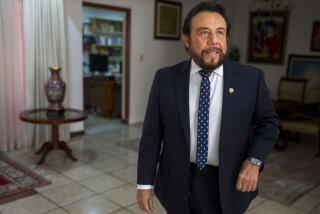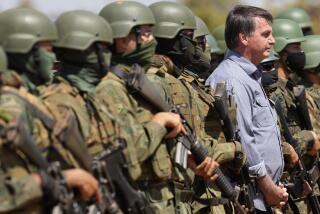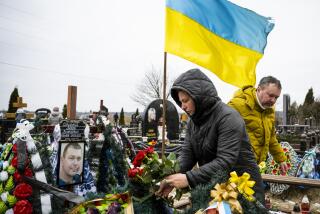Military Warms to Aquino but Peace Talks May Chill
MANILA — For five years, Rudolfo Salas had a $12,500 price on his head.
As the shadowy commander-in-chief of the communist New People’s Army, Salas headed the Philippines’ underground revolutionary movement for nearly a decade. Under his leadership it grew from a ragtag band of a few hundred ill-equipped idealists to a nationwide army of 22,000 committed regulars. Now the government regards it as the most serious threat to national stability.
At 8:45 p.m. on Sept. 29, Salas, 39, known as Commander Bilog, seemed hardly worth even $12,500. He was leaving a Manila hospital after minor surgery for an inflamed goiter, and was dressed as a peasant, sitting beside his wife in the back of a rented Toyota Corolla.
But when a team of military intelligence officers waiting outside the hospital arrested Salas on charges that carry the death penalty, they bagged a trophy that government leaders, civilian and military, say was priceless.
Rather than deepening the divisions between President Corazon Aquino’s civilian Cabinet and her increasingly frustrated military, as the Communists predicted it would, the arrest of Salas, a key member of the Communist Party Central Committee and head of its National Military Commission, gave Aquino a golden opportunity at a critical moment to forge closer ties with military men she now calls “my soldiers.”
It gave her a chance to show the Reagan Administration and congressional and military leaders in Washington that she is prepared to stand by the hard-line position that she took against the Communist rebellion during her U.S. visit last month. Indeed, the U.S. Senate responded a few days later by approving $200 million in new bilateral aid to the Philippines next year, and Sen. Bob Dole (R-Kan.) made it a point to applaud Aquino’s stance on the Salas issue.
And rather than sabotaging the government’s delicate cease-fire talks with the rebels, as the rebels also predicted it would, Salas’ arrest appears to have given Aquino the upper hand in the talks. It has distracted the Communist negotiators from their demands for a military withdrawal from areas where the Communists exert strong influence and forced them to focus on a new priority, securing Salas’ release.
In rejecting a call by the Communists’ political arm, the National Democratic Front, to overrule the military and release Salas immediately, Aquino also won the support of many once-suspicious middle-level military officers. And she confronted the Communist negotiating team with a more unified government than they had thought possible.
From the moment that the military placed Salas in a maximum-security cell, Aquino has stood by his arrest, putting to rest fears among the military and the nation’s political right wing that she stood too far to the left for the military. Aquino’s stance identifies her more firmly with the right, however, raising the prospect of a military counteroffensive against the rebels. It further polarizes the argument about how to pursue the civil war, and it leaves in grave doubt the long-term hopes for peace.
The response from the political left to Aquino’s decision to keep Salas in custody was predictable. The left charges that the arrest proves the government has been negotiating in bad faith.
Moreover, the newly formed leftist political party, the Peoples Party, declared that the arrest was a blow to the chances of a cease-fire and a political settlement.
The military establishment responded with an equally bleak forecast about the possibility of a political settlement.
“Don’t expect a peaceful solution to this problem,” Defense Minister Juan Ponce Enrile ad-libbed in a Rotary Club speech on Monday. “I have grave doubts about that possibility.”
Enrile, who has been a constant critic of Aquino’s peace overtures to the rebels, said Tuesday that her decision to abrogate the 1973 Marcos constitution had led many Filipinos to conclude she had forfeited her electoral mandate. Enrile, who is believed to harbor presidential ambitions, also said last week that failure to heed advice brought down the Marcos government and that the same fate could befall Aquino.
The peace talks have been suspended since Salas’ arrest but there is some hope that they will be resumed when the dust settles.
Aquino said in a statement congratulating the military on their efficiency, “In the meantime, the government keeps the door open for a cease-fire.”
The National Democratic Front responded in kind, saying it is willing to continue the negotiating sessions but emphasizing that Salas’ release will be essential to any permanent settlement.
Bolstering that position, Bernabe Buscayno, the alleged founder of the New People’s Army, whom Aquino personally ordered freed from prison two days after she took power, praised the president in a speech as a “sincere” leader who is seeking “a genuine peace.”
Still, the military leaders and independent political analysts remain skeptical about the prospects for the peace talks, even if both sides return to the bargaining table. Enrile, who has defended his “red-scare” speeches as warnings to a nation on the brink of disaster, continued his campaign to pressure Aquino into allowing him to turn his 200,000 men loose against the guerrillas.
“I can say in all candor that the Marxist movement in the Philippines today is growing, and growing at a very alarming rate,” he said Monday. “If we do not act firmly now, the battle could run far into the future, and it will be long and hard. For if we do not wage it decisively now, it could well erupt into a total war that will give us neither a moment of calm nor a moment of respite, but greater misery and death for many of our countrymen.”
Behind such pronouncements, which Enrile has been making for months, day after day, at luncheon and dinner meetings, is a classified Philippine military document entitled “Intelligence Estimate on National Situation.” It was prepared by military intelligence analysts, and a copy was made available to The Times.
It confirms CIA estimates of Communist strength in the Philippines--22,000 armed regulars who now wield influence in nearly 20% of the nation’s 40,000 villages.
The document estimates that the strength of the New People’s Army, at its present rate of growth, will be 25,000 by 1990, strong enough to achieve what the party calls “the strategic offensive substage.”
“At this substage, the New People’s Army is supposed to launch an all-out attack on Armed Forces of the Philippines and police detachments similar to the Tet offensive in South Vietnam in 1968,” the document says. “The purpose would be to force the armed forces units to abandon the countryside.”
Already, the document says, more than 1,600 soldiers, rebels and civilians have been killed in the conflict since Aquino took power on Feb. 25. And it warns that the Communist Party strategy calls for continued attacks on military targets, infiltration of legitimate labor unions, government institutions and universities, and “an ongoing campaign to create a wedge between the government and the armed forces.”
Enrile has used the Salas arrest to bolster his contention that the New People’s Army has already infiltrated Manila.
“During the Marcos regime, the insurgents were in the jungles,” said Enrile, who was defense minister under Marcos before he led the February rebellion against him. “Today they are in the cities and towns. Now they are showing not only an unusual military strength but also a political strength unknown to us previously. They have reached a level of boldness where they feel they can confront us openly.”
Such concerns, though, may become moot in the coming months. Senior cabinet ministers have said privately that Aquino is weighing several military options that have been presented to her by the military chief of staff, Gen. Fidel V. Ramos. Among them is said to be a plan for selective offensives against the rebels in the provinces where they are strongest.
Ramos himself hinted at the plan at a recent Rotary Club meeting. To combat the rebellion, he said, “We say we need all-out friendship and all-out force. We’ve already tried the all-out friendship, and the rest is better left unsaid.”
More to Read
Sign up for Essential California
The most important California stories and recommendations in your inbox every morning.
You may occasionally receive promotional content from the Los Angeles Times.










